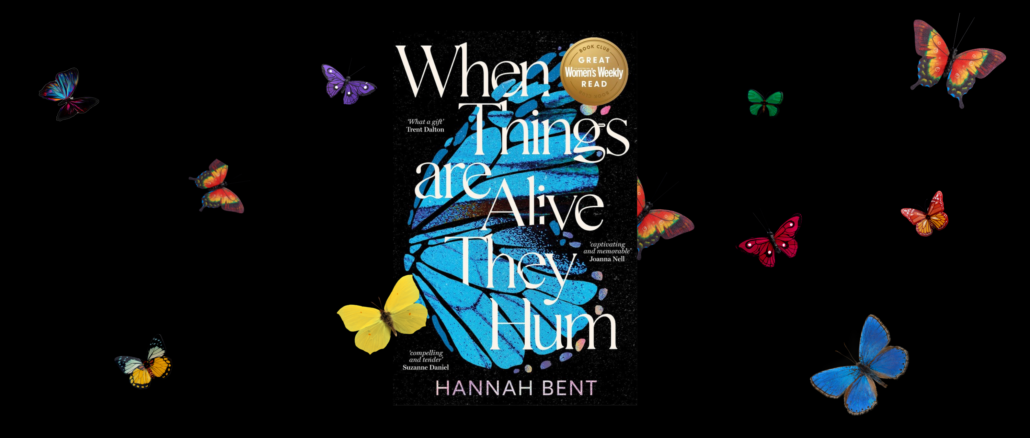
For those living on the precarious outer-rim of the sphere of modern society (which includes those labelled ‘disabled’, among other marginalised groups), both subtle and solidly brutal words and acts of discrimination frequently penetrate to the very core of the being these nobly-living folk. This sad fact is certainly exemplified in Hong Kong-raised director and author, Hannah Bent’s, supremely observational and heartbreakingly confrontational debut novel, “When Things Are Alive They Hum”.
Set predominantly in contemporary Hong Kong, and to a lesser degree present-day Shanghai and London, this exploration of the fragility of the universal human condition is told in alternating segments in the first-person narrative by our two young adult protagonists, sisters Marlowe and Harper.
Marlowe is a high-achieving, conscientious and stridently ambitious PhD candidate at university in London, researching “the symbiotic relationship between the arion arvae and the populations of the sabuleti”, with the noble objective of “significantly (aiding) the conservation practices of the butterfly”. Marlowe’s younger, but in many ways wiser, sister Harper was born with Down syndrome (or as Harper likes to name it “the Up syndrome”), and a harshly devastating part of her ‘condition’, is that she was born with heart defects. Harper’s ‘bright light’ in her life is her devoted boyfriend Louis, who also has Down syndrome.
Marlowe rushes from London to be by her beloved sister’s side in Hong Kong, when Harper’s health begins to bleakly deteriorate, and it emerges that Harper’s sole chance of survival is to receive a rare heart and lung transplant. Marlowe has, prior to this urgent return, not been home to Hong Kong for a year. She has been happily encased in her life in London, living with her boyfriend, Olly, and perpetually studying. Her emotionally painful journey to Harper’s side enables her to see Harper, her English father (James), her father’s girlfriend, Irene, and her devoted maternal Chinese grandmother, Wai Po, (Marlowe and Harper’s mother passed away from cancer when Marlowe was nine years old and Harper was three).
The family, including Harper, have a conference with a demonstrably intelligent, yet emotionally vacant, professor (at the fourth hospital the family have tried, to get help for Harper). The professor informs them that while Harper is in dire need of a heart and lung transplant, she is not eligible to be put on the waiting list for these procedures, as because of her ‘condition’, “she is not an appropriate candidate for a heart and lung transplant”.
Harper’s family are brutally gutted by this ostensibly miserable news. James laments, “this is Hong Kong. No one is interested in the rights of disabled people here”. Harper, despite having held a job as a library assistant, going to a vocational centre and helping Wai Po with the cooking at home, has definitely been on the receiving end of numerous types of discrimination, yet the professor’s cruel demeanour and attitude at the hospital regarding Harper’s plight most certainly trends as being towards the pinnacle of Harper’s mistreatment by others, up until this point in her life (the professor also sneakily ignores Harper at the family conference). Harper staunchly refuses to ‘see’ or acknowledge her health is poor; as she optimistically, yet naively, tells her family, “It’s a new day and the doctors are fixing my body”.
When Marlowe discovers excitedly that she can obtain for Harper a heart and lung transplant at a hospital in Shanghai, China, for “sixty-five thousand (US) dollars”, Marlowe is over the moon. This is despite the fact that Harper keeps on insisting that she does not want a ‘new heart’, and that she is happy with her present one. And it is despite that fact that the Chinese transplants that Marlowe wishes to pay for are “not a regulated industry”. These black-market transplants are fuelled by prisoners who have been executed (including political prisoners).
Before long, Marlowe has surreptitiously organised for herself and a clammy and pale Harper to travel to Shanghai, where the weary sisters stay with their compliant cousin, Bi Yu, while Marlowe awaits the ‘go-ahead’ from the shady broker for the operation, Mr Zhang.
Is Harper going to get the operation that Marlowe vehemently wants for her sister, for Harper to live the life she dreams of with her beloved Louis? Despite the ‘expert’ opinions of others, does Harper ‘see’ more in this world than most people could ever fathom?
Hannah Bent has written a novel shimmering with poignant insights about the ‘disabled’, and so-called ‘normal’ human conditions. Hannah has a sister, Camilla, with Down syndrome, and Hannah’s keen powers of observation, as well as her great intelligence, permeate every page of this novel. Marlowe and Harper’s journey is in turns heartbreaking, soul-destroying, and resolutely uplifting. This book captivated and enthralled me, and showed me that ultimately we as a human race do not always have all the answers in life. And that there is an avalanche of life lessons that we can learn from those such as Harper, who are frequently overlooked in society, yet have the potential to offer us demonstrable insights and wisdom.


Leave a Reply